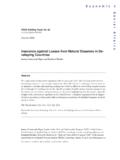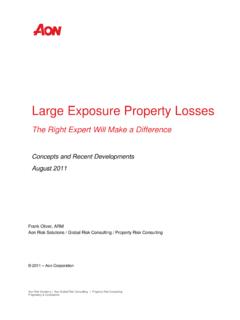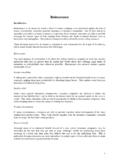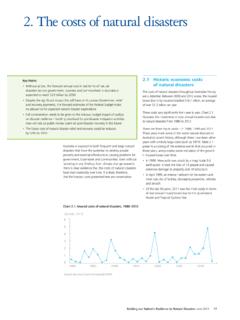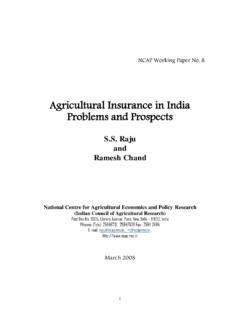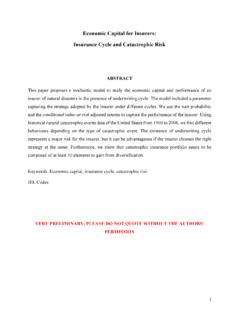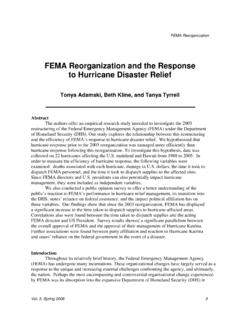Transcription of 3.0 ENGINEERING INSURANCE BASIC PRINCIPLES
1 ENGINEERING INSURANCE In industries and factories, even in offices or at home, nowadays more and more machinery and equipments are being used. They are exposed to various accidental losses like fire, theft, accidental breakdown etc. Such losses not only cause financial stress on its owner but also hinder normal operation of the Industry. Apart from this, massive ENGINEERING projects ranging from building of bridges to set up thermal power stations are very common in today s era of industrialization. Major accidents or natural disasters like earth quake etc will cause immense losses to such projects. ENGINEERING Policies are designed to provide coverage against such accidental losses. BASIC PRINCIPLES The following BASIC PRINCIPLES are applicable for ENGINEERING INSURANCE Contracts.
2 Insurable Interest Indemnity Utmost Good Faith Subrogation Proximate Cause Contribution TYPES OF POLICIES Broadly, various ENGINEERING policies can be classified as follows: 1. Construction Phase INSURANCE ( Project Policies). These are one time policies issued for entire project period irrespective of whether the project period irrespective of whether the project period is a few days or a few years: I. Contractor s All Risk INSURANCE (CAR) II. Erection All Risk INSURANCE (EAR) [ also known as Storage-cum- Erection or SCE INSURANCE ] III. Marine cum Erection INSURANCE (MCE) Operational Phase INSURANCE ( Annual Policies ) I. Machinery INSURANCE II. Contractor s Plant and Machinery INSURANCE III. Electronic Equipment INSURANCE IV.
3 Boiler and Pressure Plant INSURANCE V. Deterioration of Stock INSURANCE (DOS) VI. Civil ENGINEERING Completed Risk INSURANCE ( CECR) VII. Contract Works INSURANCE (CW) VIII. Machinery Loss of Profit INSURANCE ( MLOP) IX. Boiler Loss of Profit INSURANCE ( BLOP) CAR INTRODUCTION: Following rapid industrialization and infrastructure development, this form of INSURANCE has gained a lot of popularity. Any kind of large construction projects involves a number of hazards both for Principals as well as Contractors and the only way to economically safe guard against all natural and human hazards is by way of a CAR Policy. JURISDICTION: This applies to all Risks located in India where the value of Civil ENGINEERING Works is more than 50% of the total Contract Value.
4 SUBJECT MATTER: Contractors All Risk (CAR) INSURANCE Policy is suitable for Construction of Civil works as well as composite projects. SCOPE OF COVERAGE: All Risks (with certain exceptions) involved during storage, assembly, erection/Construction against:- fire, lightning, explosion/implosion, aircraft damage, flood, storm, earthquake, landslide, theft, burglary, RSMD, terrorism, negligence, lack of skill, collision, impact, dropping short circuit, electrical/mechanical breakdown etc. FEW OF THE EXCEPTIONS ARE AS UNDER: Damage due to faulty design, defective materials etc. Willful negligence, bad workmanship, Consequential loss say penalty for delay etc. Inventory losses War, nuclear reaction, Normal wear and tear, gradual deterioration etc.
5 CONSTRUCTION PERIOD The liability of the Company shall commence, (notwithstanding any date to the contrary specified in the Schedule) only from the time of commencement of work after the unloading of the property specified in the schedule from any conveyance at the site specified in the schedule whichever is earlier and shall expire on the date specified in the schedule. However, the Company s liability expires also for parts of the insured contract works taken over or put into service by the Principal prior to the expiry date specified in the policy whichever shall be earlier. If actual construction period is shorter than the period indicated in the schedule, no refund of premium shall be allowed unless specifically allowed by Insurers.
6 At the latest, the INSURANCE shall expire on the date specified in the Schedule but if the work of construction included in the INSURANCE is not completed within the time specified hereunder, the Company may extend the period of INSURANCE but the Insured shall pay to the Company additional premium at rates to be prescribed by the Company. SUM INSURED: The Sum Insured under CAR Policy should represent the completely erected value of the project to be installed including freight, customs duties and erection cost. This should represent the current replacement value of the items when erected. Following heads are to be taken for arriving at the Sum Insured: a) Marine (Imports) -landed cost at site b) Marine (Indigenous) -landed cost at site c) Cost of Erection (exclusive of preoperative expenses but inclusive of cost of visits of specialists and supervision charges).
7 D) Permanent Civil ENGINEERING Works e) Half the escalated value, if escalation is opted for. f) Pre- operative expenses. For additional Covers, suitable limit has to be selected for the opted ones MARINE/TRANSIT RISKS CONNECTED WITH CONTRACTORS ALL RISKS INSURANCE Where Marine/Transit INSURANCE connected with Contractor s All Risks INSURANCE of any project is placed in India simultaneously or later on in one combined policy or under separate policies, in one department or in different departments, the matter relating to Contractors All Risks Cover is required to be underwritten, subject to these General Regulations. The loss due to breakage of glass can, however, be covered by payment of additional premium as follows - i) CAR rates so worked out as per guideline provisions should be loaded by 25 % ii) Excess on glass items shall be 10 % of aggregate sum insured of all glass items.
8 COMPUTATION OF PREMIUM Premium shall be computed for the total period commencing from i) Commencement of work OR ii) Date of arrival of the first consignment at the site of construction Whichever is earlier. MINIMUM STFI RATE APPLICABLE : per mille per annum Premium is to be charged on pro-rata basis based on duration of the policy. No discount of any kind including higher excess discount is to be allowed as these are minimum rates. ADDITIONAL RATES FOR EARTHQUAKE (FIRE & SHOCK) PERILS a. Irrespective of the sum insured for CAR, the following additional rates are to be charged over the CAR rate: Minimum rates applicable 1/3/2012 Zone Applicable rate (%o) per annum Zone - I Zone II Zone III Zone IV b.
9 Premium is to be charged on pro-rata basis based on duration of the policy. c. No discount of any kind including higher excess discount is to be allowed as these are minimum rates. d. These additional rates take care of CAR earthquake (Fire & shock) perils only. e. For policy for extensions with overall period (including original policy period) in excess of 12 months, the CAR earthquake rate should be reworked. f. Earthquake cover is optional for all the zones but cannot be opted Mid-term or for part of the total CAR Period. g. Earthquake cover on first loss basis - earthquake cover could be granted on first loss basis with Sum Insured limits of 20% (OR 10%) of the total Sum Insured at the rates of 50 % (OR 40 %) of the rate calculated on the total sum insured.
10 MID-TERM INCREASE IN SUM INSURED DURING POLICY PERIOD - In cases where the Sum Insured for CAR is required to be increased during the policy period, the premium should be collected on the additional Sum insured at applicable CAR rates since inception of policy. It is not permissible to charge pro-rata premium on such increased sum insured. Mid-term increase in SI shall be affected only after the same has been recorded in the policy by the Company before the occurrence of any claim. EXCESS FOR CLAIMS ARISING OUT OF ACTS OF GOD PERILS A) For risks situated in earthquake Zone I and II the minimum excess for claims arising out of AOG perils shall be as under during the entire policy period (including all extensions) Zone I Rs.

